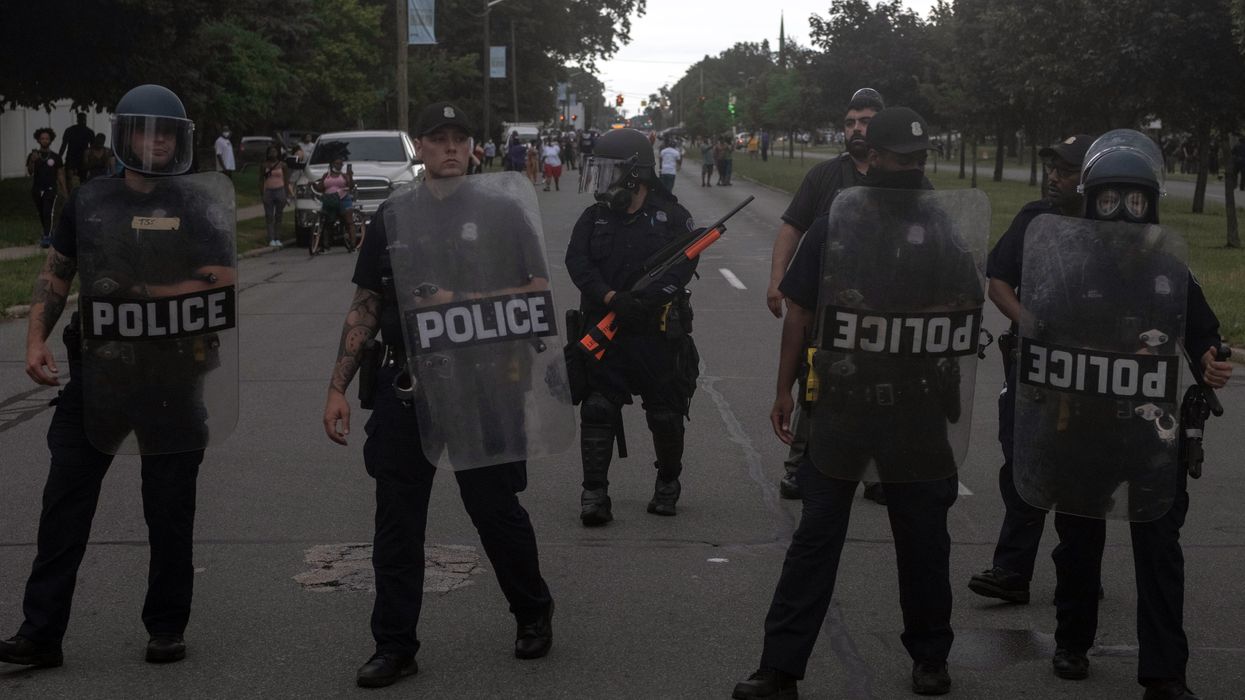
Photo by SETH HERALD/AFP via Getty Images

Fair
A federal judge on Friday ordered a temporary ban on Detroit police officers using anti-protest gear — such as shields, batons, tear gas, rubber bullets, and more — against peaceful protesters following a lawsuit from protest group Detroit Will Breathe.
The ruling will prohibit officers from using such crowd control tactics on "peaceful protesters" for a period of at least 14 days.
Detroit Police Chief James Craig says he supports the move, and insists that his officers have only used force when demonstrators were not peaceful.
The organization filed a federal lawsuit alleging that Detroit police habitually used "unnecessary, unreasonable, and excessive force" during protests, which violated demonstrators' constitutional rights.
The order states, "For a period of 14 days, to be extended upon a showing of good cause, but not beyond 28 days absent consent by ... the City of Detroit, including the Detroit Police Department ... is enjoined from: using striking weapons (including, but not limited to, batons and shields), chemical agents (including, but not limited to, tear gas and pepper spray), or rubber bullets against any individual peacefully engaging in protest or demonstrations who does not pose a physical threat to the safety of the public or police."
Other temporarily prohibited actions include "[d]eploying chemical agents or a sound cannon against persons peacefully engaging in protest or demonstrations without an audible warning and a reasonable amount of time to disperse."
Police are also prohibited from placing any demonstrators "in a chokehold," or "ramming with a vehicle any individual attending a demonstration."
The order added, "In the event that Plaintiffs seek relief for an alleged violation of this Order, the City must respond to the motion for relief within 24 hours."
The organization's suit accused police of using forceful tactics to disperse peaceful protesters, including tear gas.
"[Peaceful protesters] have been tear-gassed, pepper-sprayed, beaten, and otherwise subjected to unconstitutional excessive force, shot with rubber bullets ... put in chokeholds ... and arrested en masse without probable cause."
Craig said that the order changes nothing since it focuses on peaceful protesters.
"The judge's order is no different than what we've always done," Craig said. "Every time we've had to use less-than-lethal force, it's been to address violence by protesters, resisting arrest, or when they've tried to take over an intersection in violation of the law. Technically, nothing has changed.
"We're going to continue to do our jobs the way we've done it," he added. "We respect peaceful protesters. We understand the judge's order and we'll make sure the protesters understand if there's any aggression or violation of law, they will get ample notice like we've done in the past."
Craig added that if a protester is, however, resisting arrest or unlawfully acting out, officers will continue to use reasonable force.
"If someone is resisting arrest, or trying to attack our officers, we will use the force that's both reasonable and necessary to overcome the resistance," he explained. "We don't want the protesters injured, and we don't want officers injured, either."
Craig also pointed out that officers have not engaged in the use of chokeholds, considering that such practices are "already banned in Detroit," and questioned why the tactic was banned by the order to begin with.
"[T]hey're already banned in Detroit except in life-or-death situations," he reasoned.
Craig also promised that protests will be filmed for posterity.
"We want to document everything. When we give orders to disperse when people are blocking an intersection, and they refuse repeated orders, we want all that documented when we make arrests."
According to the Detroit News, city attorney Lawrence Garcia said that the lawsuit was welcomed, because "it allowed the city to file a counter-suit."
Garcia also expressed his disappointment over the ruling, saying, "We are disappointed the order was entered without an evidentiary hearing because we believe when the evidence is heard, the police actions to date will be deemed justified."
Detroit Will Breathe lauded the move, and in a Friday statement, its attorney said that the group is "relieved" to be able to commemorate its 100th day of protest "safely and peacefully, without fear or violent retaliation or unlawful arrest by police."
The group is expected to seek a permanent injunction as the temporary restraining order is only in effect for 14 days.